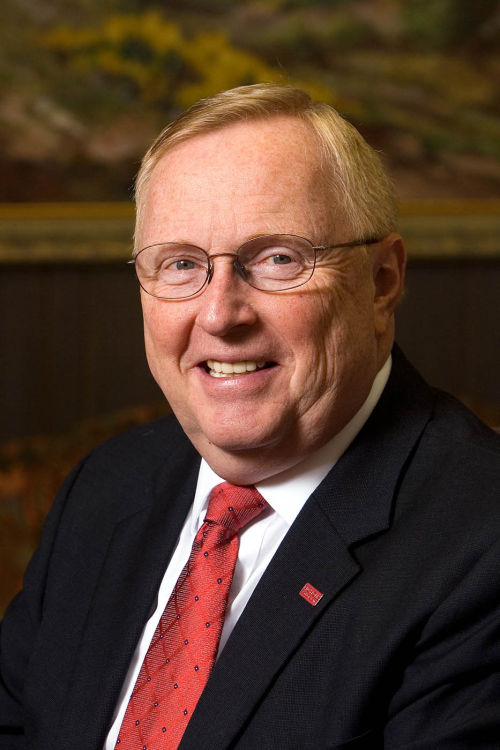
Is NCAA ’14 worth the buy? T-PT says maybe, maybe not
July 9, 2013Breck to talk storm readiness at TEDA event
July 9, 2013Retiring Nicholls President Stephen Hulbert denounced the state’s management of post-secondary education during an address to business leaders on Monday.
Several elected officials were in attendance, including state lawmakers from Lafourche, Terrebonne and St. Charles parishes.
“The lack of a strategic plan for higher (education) is holding us back as a state,” he said.
To exemplify the statement, Hulbert described his contempt with Senate Bill 204, a capital-outlay bill that authorized $252 million in new capital construction in the Louisiana Community and Technical College System.
“It was a beautifully designed political strategy by Joe May and the Technical College Board,” Hulbert said. “They salted the project list with items in every region, every district, so legislators felt they had to support it, and I heard legislators say, ‘I have to support higher ed.’ I, for one, don’t question the need of facilities for the technical community college. I have been a voice of support from the four-year sector for community colleges.
“ … That bill, basically, by my definition, was a rogue bill. It didn’t come through the Board of Regents, which is the appropriate structure, but it had the political support of strong, seasoned legislators. Eventually, it had the support of the governor. It managed to have a life that got it through approval and enactment.”
After the governor signed SB 204 into law, May praised lawmakers for taking a step to modernize facilities and supporting the technical and community college realm that he said would “create a growing middle class.”
“By the way, being outspoken as I usually am,” Hulbert continued, “in every other state system that I’ve been in, the board of supervisors for the Technical Community Colleges would have been held accountable for moving outside of the Board of Regents to gain legislative approval. Some of the executive leadership of that organization would have their positions terminated for what they did. But because in Louisiana we have the support of powerful legislators and the governor, they get congratulated for that. That’s not the way to run higher ed.”
Fletcher Technical Community College, headquartered in Schriever, was allocated $4.5 million through SB 204 for student services, counseling and advising.
The outgoing president went on to say the state has not committed itself to supporting the educational infrastructure in place.
“Over the 10 years I’ve been here, I’ve constantly heard conversation of, ‘Why do we have four boards, or actually five – the Board of Regents and the four boards of supervisors? We need only one board.’ But we argue and we talk, and we’re not going anywhere,” Hulbert said. “The reality is we don’t support the structures that we have.”
Hulbert also bemoaned the “devastating cuts” inflicted, in general, to higher education under his tenure. “We say in Louisiana that we have a commitment to higher education,” he said. “In reality, the facts don’t bear that out.”
From 2008-09 to 2012-13, state support to Nicholls State University had fallen by $17.9 million, or 50 percent. In addition to imposing a salary freeze on all non-promoted personnel, the university eliminated 33 faculty positions, or 12 percent, over that time and cut its operating budget to $52 million, down 11 percent from 2010-11.
“People ask us, ‘How does Nicholls continue to do its job?’” Hulbert said. “I’ll tell you how we’ve done it: We’ve done it on the backs of employees.”
Hulbert said that, statewide, the diminutions would take a decade to recover from.
Roughly two-thirds of the state’s operating budget is protected from cuts due to constitutional or statutory edicts and dedications, federal mandates and other obligations. Higher education and health care are not protected, so the state’s lawmakers and administration look there often in times of fiscal stress. So when state officials respond to dried up revenue, they are often forced to look at higher education and health care.
State Sen. Norby Chabert, R-Houma, said afterward the problem won’t be fixed until the state removes protections from alternative dedicated funding. In some cases, this means changing the state Constitution.
“Until we address our state budget with a constitutional convention, we are doomed to more of the same,” Chabert said. On the likelihood lawmakers convening to address budgetary woes, he added: “There’s a bill filed every year.”
Declined state support is debilitating to all public universities, including Louisiana State University and Louisiana Tech, Hulbert said, but its impact inflicts more damage on regional institutions.
“Regional universities and regional colleges are here to serve the people we are provided for,” Hulbert said. “We don’t seek to be something we’re not, but we want to grow and continue to grow in serving your needs.”
Nicholls became a selective-admissions institution in 2005. As reported by the Tri-Parish Times today, admission standards include a composite score of 20 on the ACT, with an English sub-score of at least 18 and a math sub-score of 19.
Hulbert said the university was able to transition to selective admissions due to the state-funded scholarship-assistance program TOPS and because K-12 education is producing enough quality students.
Nicholls’ four-, five- and six-year graduation rates have risen under Hulbert’s tenure, reaching their highest point with 2005-06 first-time freshmen, the latest available data. That class’s six-year rate at the same institution was 38.4 percent of 1,171 cohorts, according to institutional research. For the 2002-03 freshman class, those figures were 26.6 percent of 1,404 enrollees.
The university also recently introduced Nicholls Online, geared at continuing education for people who have received college credit at some time but decided to postpone college for various reasons.
A plan is in place to introduce a maritime concentration under a business degree, Hulbert added. As it pertains to petroleum education, Nicholls hopes to partner with Fletcher and the local business community to offer the region more than a two-year degree.
“I constantly encourage us to work in partnerships in government and in post-secondary education at all levels,” Hulbert said. “Let’s talk openly about the funding of the institutions and what we’re accomplishing.”
Before the speech, the Bayou Industrial Group awarded him with its first-ever honorary BIG Achiever Award, which is typically handed out annually to exceptional businesses and their leaders. Lafourche Parish President Charlotte Randolph then presented a government proclamation honoring him for assisting the parish’s economic welfare through his leadership.
Hulbert will retire Aug. 1 to Arizona to be closer to family.
He said he would to work with the Registry of College and University Presidents, an interim service that offers people with presidential experience to schools needing a transition.
Prior to arriving at Nicholls, Hulbert served as chancellor of the University of Montana-Western for four years, the commissioner of higher education in Rhode Island, and interim president, provost, vice president for academic affairs and vice president for administrative services at the University of Northern Colorado.
Larry Howell, who rose to become university’s executive vice president under Hulbert, was named the interim president last month. He will man the top seat until a long-term replacement is found and retained.
Nominations and applications to the position are tentatively due on Aug. 1. After the applicant pool is whittled down over the next four-to-six weeks, public interviews of finalists by the University of Louisiana System Board of Supervisors are tentatively scheduled for early September.
*******
CLARIFICATION to readers:
An earlier version of this article may have misrepresented Nicholls State University President Stephen Hulbert’s comments regarding consolidation of the state’s higher education governing boards. It previously stated that Hulbert called for the consolidation of five boards into one. The passage has been changed to reflect verbatim what Hulbert said.
In an email to the Tri-Parish Times on Wednesday, Hulbert said:
“For the record, I have never taken a position on one board verses multiple boards. Throughout my career, I’ve worked under a variety of highly functional higher education governing structures. Experience has taught me that the issue is not whether you have one board, two boards or five boards, it’s the lack of support by state government and by the colleges and universities the governing board(s) serves. Until we support the structures we have and truly commit to improving higher education in Louisiana, we will continue to struggle.”
The article also previously stated incorrectly that Hulbert “accepted the position with the Registry of College and University Presidents.” In fact, he said: “I am going to work for an organization called the Registry of College and University Presidents…”
In his email on Wednesday, Hulbert said:
“Working with the Registry is one of several professional opportunities that I will consider after I settle into retirement.”
Finally, the name of the president of the Louisiana Community and Technical College System is Joe May, not Joel May.














